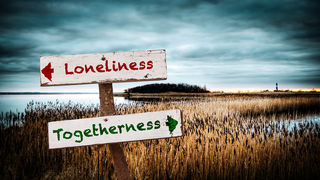Loneliness
Why Do We Feel So Alone?
Nearly half of Americans report sometimes or always feeling alone.
Posted November 4, 2019 Reviewed by Ekua Hagan

All the lonely people / Where do they all come from? — The Beatles, “Eleanor Rigby”
On paper, it doesn’t seem like anyone should feel lonely in the 21st century. Never before have we had the ability to connect to seemingly everyone that we’ve ever met with just a few clicks on one of a half-dozen social media sites. We like each other’s witty tweets or we Instagram pics of our vacations, and we friend on Facebook people we haven’t seen—or even thought about—since high school. And yet, we feel lonely.
A 2018 Cigna survey of 20,000 people used the UCLA Loneliness Scale to determine that “Nearly half of Americans report sometimes or always feeling alone (46 percent) or left out (47 percent).” Scratch beneath the surface a bit, and the reasons for the current loneliness epidemic are clear.
You may be able to connect with thousands of people online, but how often do those online connections turn into real-world ones? Take internet dating, for example. Years of swiping left and right turn searching love into a sport, as if we’re all collecting faces for some cosmic game of Guess Who. If your romantic life began before Tinder and Hinge and you’re still single, you might miss the days of chatting up a stranger at a party. Now you can have several dating apps on your phone with multiple matches on each, but no dates. There are so many choices that you’re overwhelmed, and you end up choosing no one. Today, giving your phone number to someone you’ve just met feels shockingly old-fashioned.
Have you watched teenagers hanging out with their friends lately? To Gen Zers, spending time with their friends means sitting side by side on their laptops or smartphones. Every once in a while, one of them will say something or look up from their screen. Kids these days!
And what’s the point of having all those Facebook friendships with old classmates and coworkers if you never see them in person or even chat with them on the phone? And why scroll through photos of perfectly curated lives on Instagram when they make you feel bad about your own?
We’re always surrounded by connections, but feelings of loneliness nag at us until we’re forced to acknowledge that the cyberfriendships we’ve made are an illusion. Bits of data will never love us or understand us. An app can’t comfort us when we’re sad. Photos of our dinners might get us likes online, but eating a perfect-looking meal alone won’t fulfill us the way a messy-looking potluck with friends does.
We can’t attribute all loneliness to social media, of course. After all, people who don’t use it are lonely too. But perhaps all of the people those anti-social media folks could befriend are too busy feeling lonely online to meet them.
The internet can become a trap. We want to meet new people, but the only way people seem to get together these days is online. The more time we spend online trying to find new friends or dates, the lonelier we feel.
According to the Cigna study, “Only around half of Americans (53 percent) have meaningful in-person social interactions, such as having an extended conversation with a friend or spending quality time with family, on a daily basis.”
The longer we go without having regular in-person interactions with others, the more out of practice we become. It can get to the point where we no longer remember how to make small talk or how to get to know someone new.
Humans are social animals. If we hadn’t banded together to divide the labor and fight off predators, we likely wouldn’t have survived and evolved. The Cigna study shows that people who live with others are slightly less likely to be lonely than people who live alone (43.5 percent versus 46.4 percent). But we can feel lonely even when we’re not alone. “One in five people report they rarely or never feel close to people (20 percent) or feel like there are people they can talk to (18 percent),” the study says. People everywhere, but not a one you’d want to get a drink with.
A 2018 study in the journal International Psychogeriatrics showed that “Loneliness severity and age had a complex relationship, with increased loneliness in the late-20s, mid-50s, and late-80s.” Dr. Dilip Jeste, the study’s senior author, told CNN some reasons why these ages may be significant.
“The late 20s is often a period of major decision-making, which is often stressful because you often end up feeling that your peers made better decisions than you did, and there’s a lot of guilt about why you did this or did that,” he explained. Some call this a quarter-life crisis.
During the midlife crisis that often occurs in a person’s mid-50s, your health might start to decline, and you may discover you have long-term health issues like heart disease. “It’s the first time you realize that your life span is not forever,” Dr. Jeste says.
When you hit your late-80s, you may feel lucky you’ve lived so long, but issues can compound—health troubles, financial worries, deaths of loved ones. Stress plus loss is a recipe for loneliness.
It doesn’t have to be this way, of course. There are things we can do to combat the feelings of loneliness we have. But they require getting out of our comfort zones a bit. Instead of endlessly adding friends on social media whom you have no intention of speaking to, you should pick one and send them a message. Maybe it’s someone you were once close to but lost touch with, or a family member you wish you saw more often.
You could also consider getting a roommate, moving in with someone, inviting family to live with you, or moving to a retirement community, if that’s an option. For hundreds of years, humans lived in close societies; we knew our neighbors well. We worked with them, were friends with them, and intermarried with them. In some cultures, it’s still common for multiple generations to live under one roof.
Another idea to fight loneliness, backed up by a plethora of research, is volunteering. Many studies show that people who volunteer are happier and feel less isolated than people who don’t. Volunteering is an excellent way to get out of your home, meet new people, and interact with the world. You can also learn new skills, which will boost your self-esteem.
There are many reasons why we feel alone, but there are also many ways we can fight it. Loneliness may be an epidemic, but you don’t have to be a victim of it.




